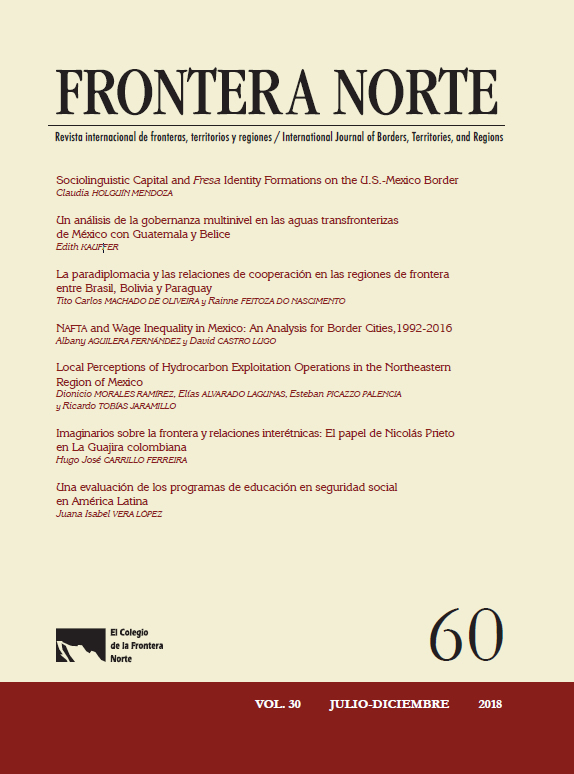Mexican Democracy at the Subnational Level: From Dehegemonitazion to Patrimonialism
Main Article Content
Abstract
Article Details

This work is licensed under a Creative Commons Attribution-NonCommercial-NoDerivatives 4.0 International License.
Authors publishing work in this journal agree to the following conditions:
Authors retain copyright and assign first publication rights to the journal Frontera Norte (RFN), with the texts registered under an Attribution-NonCommercial-NoDerivatives 4.0 International Creative Commons license (CC BY-NC-ND 4.0), which allows third parties to use published material provided they give credit to the authors and acknowledge this journal as the first publisher.
They authorize the reproduction, publication, translation, communication, and transmission of their paper and all accompanying material, publicly and in any form and by any means; its public distribution in as many copies as required; and public communication thereof in any form, including making it available to the public through electronic means or any other technology, and solely for dissemination and scientific, cultural, and non-commercial purposes.
Authors may enter into further independent contractual agreements for the non-exclusive distribution of the version of the paper published in this journal (for instance, to include it in an institutional repository or personal webpage, or publish it in a book), provided it is not for commercial purposes and they clearly state that the work was first published in Frontera Norte (RFN) [and add the corresponding bibliographical record: Author/s (Year). Title of paper. Frontera Norte, volume (number), pp. doi: xxxx].
To that end, authors must submit the form assigning ownership of first publication rights, duly completed and signed. This document is to be uploaded in PDF format as a complementary file on the OJS platform.
This work is released under an Attribution-NonCommercial-NoDerivatives 4.0 International Creative Commons license (CC BY-NC-ND 4.0)..
References
Dahl, R., Shapiro, I. y Cheibub, J. A. (2003). The Democracy Sourcebook. Cambridge, Estados Unidos: MIT Press.
Dahl, R. (1989). La Poliarquía. Participación y oposición. [Trad. al español]. Madrid: Tecnos.
Del Tronco, J. (2018). Una radiografía de la poliarquía subnacional en México. En M. A. López y J. Cadena-Roa (Coords.). Problemas de representación política y social en México. Manuscrito inédito.
Gervasoni, C. (2011). Democracia, Autoritarismo e Hibridez en las Provincias Argentinas: La Medición y Causas de los Regímenes Subnacionales. Journal of Democracy en Español, 3, 75-93.
Gervasoni, C. (2013) Trasferencias Federales y Competitividad Electoral: La Ventaja Oficialista de Gobernadores en Provincias Rentísticas (1983-2011). En C. Gervasoni y A. Porto (Eds.). Consecuencias Económicas y Políticas del Federalismo Fiscal Argentino (pp. 73-104). Argentina: Universidad de La Plata, Edición de Económica, Revista de la Facultad de Ciencias Económicas.
Giraudy, A. (2013). Varieties of Subnational Undemocratic Regimes: Evidence from Argentina and Mexico. Studies in Comparative International Development, 48(1), 51-80.
Guliyev, F. (2011). Personal rule, neopatrimonialismo, and regime typologies: integrating Dahlian and Weberian approaches to regime studies. Democratization 18(3), 575-601.
Isunza V., E. y Gurza A. (2010). La innovación democrática en América Latina. Tramas y nudos de la representación, la participación y el control social. México: CIESAS.
Loza, N. y Méndez de Hoyos I. (2013). De la calidad de las elecciones a la calidad de las democracias en los estados mexicanos. Revista Mexicana de Derecho Electoral, (4), 353-368.
Loza, N. y Méndez de Hoyos I. (2014). Encuesta a expertos en política estatal en México. México: Flacso.
Loza, N. y Méndez de Hoyos I. (2016). Poderes y democracias. La política subnacional en México. México: Flacso.
México Evalúa. Centro de Análisis de Políticas Públicas. (Febrero de 2018). Arquitectura del Ramo 23. CDMX: México Evalúa. Recuperado de http://mexicoevalua.org/2018/02/27/arquitectura-del-ramo-23/
Nolasco, M. y Ávila, J. (21 de julio de 2014). Si los estados de México fueran países... [Animal Político]. Recuperado de https://www.animalpolitico.com/blogueros-salir-de-dudas/2014/07/21/si-los-estados-de-mexico-fueran-paises/
Przeworski, A. y Maraval, J. M. (2003). Democracy and the Rule of Law. Nueva York: Universidad de Cambridge.
Reynoso, D. (2005). Competencia electoral y deshegemonización en los estados mexicanos. En V. A. Espinoza y L. M. Rionda (Coords.). Después de la alternancia: elecciones y nueva competitividad (pp. 165-196). México: UAM-Unidad Azcapotzalco.
Reynoso, D. (2011). La estrategia dominante. Alianzas electorales en los estados mexicanos, 1988-2011. Buenos Aires: Teseo, Flacso.
Weber, M. (1993). Economía y Sociedad. México: FCE.

